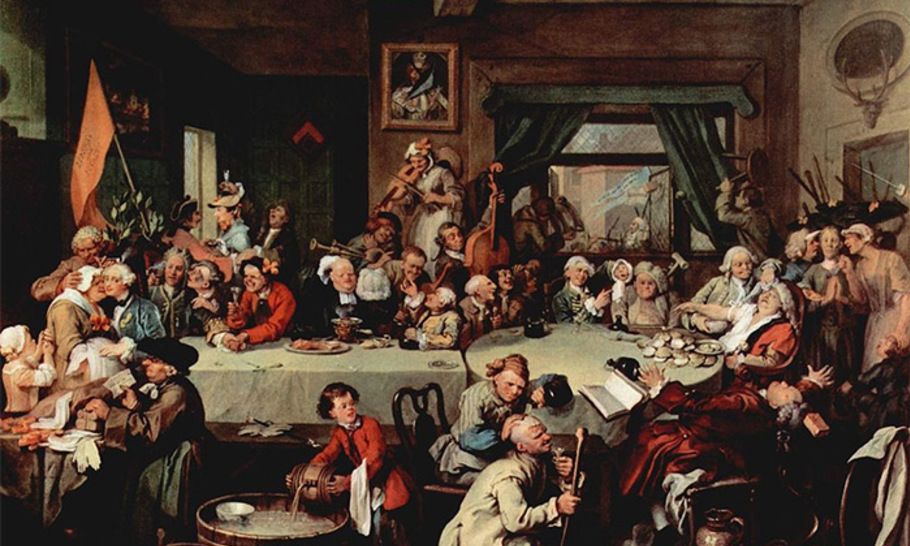Don’t be apathetic about the election. There’s life left in British democracy

From 'The Humours of an Election', Hogarth.
Nobody could claim that the British people are marching to their polling stations today in a mood of euphoria. The gruelling schedules of the closing days of the campaign have been especially fractious. The wintry weather has imparted a downbeat mood.
It doesn’t help that we only had a general election a couple of years ago, while there had been another one a couple of years before that. For those of us who have been making an effort to follow proceedings attentively, the messages have been repetitive.
The politically aware should, however, bear in mind that this “message discipline” is for the benefit of those who prefer to spend their time on other matters. Even if someone has only spent five minutes listening to Boris Johnson over the past five weeks, they will surely have heard him pleading for their vote in order to: “Get Brexit done.”
While the Conservatives are expected to win, the whole tenor of their campaign has been exasperation at the obstructive behaviour of the “dead Parliament”. Thus the election is a tiresome necessity to “clear the blockage”. The focus has been on that immediate task — and not on the sunlit uplands that may follow. Boris Johnson has shown some of his natural flair for photo ops, but this has been constrained by his team’s “safety first” approach.
The Brexit Party, so triumphant only a few months ago in the European elections, has declined into irrelevance or, indeed, has mutated into the anti-Brexit Party. The only remaining interest in them lies in identifying the seats in which they might get enough Leave votes to allow a Labour or Lib Dem candidate to beat the Conservatives.
The Lib Dem’s, who began with high hopes, have slid down the polls. The voters have not warmed to their prissy, bossy new leader, Jo Swinson.
For the Labour Party, the campaign has been especially grim. In 2017 there was an anti-establishment frisson about Jeremy Corbyn. He gained huge audiences for his rallies around the country and was received with adulation. Now the novelty has gone and his Brexit neutrality message excites nobody. The crowds are smaller and the atmosphere subdued.
Meanwhile, those critics of Corbyn who persist in standing as Labour candidates have run out of excuses. Their attempts to explain away the anti-Semitism of the leader and his followers have been excruciating.
Then we have the media: preening, self-absorbed, full of a spirit of entitlement and smug superiority. When errors are made, both the politicians and the media are too quick to accuse each other of deliberately seeking to mislead.
So nobody is happy. Yet drifting into the claim that election campaigns were better in previous years is probably lazy and misguided.
Interviewers undoubtedly do interrupt too much now. But in the past, the deference also went too far. When television broadcasting was getting underway in the 1950s, the art of the political interview was in its infancy. “Minister, do you have anything to say?” was the extent of the interrogation.
When it comes to hearing the same campaign lines tediously recited, that has long been the nature of election campaigns. The difference is that such repetition is now incessant, whether via TV news channels or by scrolling down Twitter and other social media. But those who are addicted to election coverage can scarcely complain. If we struggle to break away from it, that is our problem.
Nor am I convinced that politicians have become more dishonest. The difference is that it is harder for them to get away with it. We can all fact-check away on the internet to our heart’s content.
Is there more violence and intimidation than there used to be? Greater personal abuse? Are more posters torn down? I suspect not. It can all be filmed on mobile phones and then exposed to a wider audience. That means we hear about such instances more, but they probably happen less often.
There are disadvantages, though. Conducting more of our politics online has diminished the human element. The political parties have fewer members and fewer volunteers willing to campaign. We are less likely to argue in pubs or in public meetings. Worst of all has been the “group think” in the media and the startling erosion of free speech in our universities.
Attention spans seem to have shortened and a decline in political oratory has been much lamented. The two may be connected. The routine is for a party leader to travel great distances, speak for a few minutes to provide soundbites” for the media and then quickly move on. Gladstone used to speak for five hours — and he was not the only statesman who gave proper speeches on the stump.
It may be that if and when Brexit is finally delivered, that will enhance the political process. Not just because attention will move on to other matters, but because politics will matter more as our politicians will really be able to decide the laws we live under. It could be just the start: the “take back control” mantra should extend to all those quangos and other powerful but unelected bodies.
So don’t complain too much. Our democracy is a great source of pride. The boisterous impatience we show is messy, but it is all part of the process. A lot of technological changes have increased accountability and diversified the exercise of power. As our self-government is restored, it will have greater resonance. It may well be that our leaders are still felt to lack certain credentials of statesmanship. The ultimate challenge, indeed the patriotic duty of those who feel this, is to enter public life themselves.





